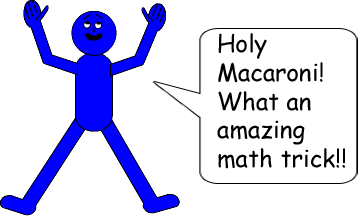
(√(2) + i√(2))2 = 4i
(√(3) + i√(3))2 = 6i
(√(-4) + i√(-4))2 = (-2 + 2i)2 = -8i
(2i * i = -2 since i2 = -1; also, it's proper complex number form to put the real part on the left & the imaginary part on the right.)
(√(1) + i√(1))2 = (1 + i)2 = 2i
(the number 1 is its own square root! Don't forget it!)
(√(0) + i√(0))2 = (0 + 0i)2 = 0i = 0
(That goes double for the number zero(0)! Plus, any number multiplied by zero is still zero!)

(√(i) + i√(i))2 = -2
(√(-i) + i√(-i))2 = 2
(√(1 + i) + i√(1 + i))2 = -2 + 2i
(√(1 - i) + i√(1 - i))2 = 2 + 2i
2xi will be equal to a real number or a complex number if x is a non-real number! You'll get a real number if x is a pure imaginary number! If x is equal to a negative imaginary number, then 2xi will be equal to a positive real number! If x is equal to a positive imaginary number, then 2xi will be equal to a negative real number!

Back to Index Page Back to Math Trick Menu
© Derek Cumberbatch